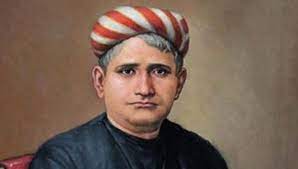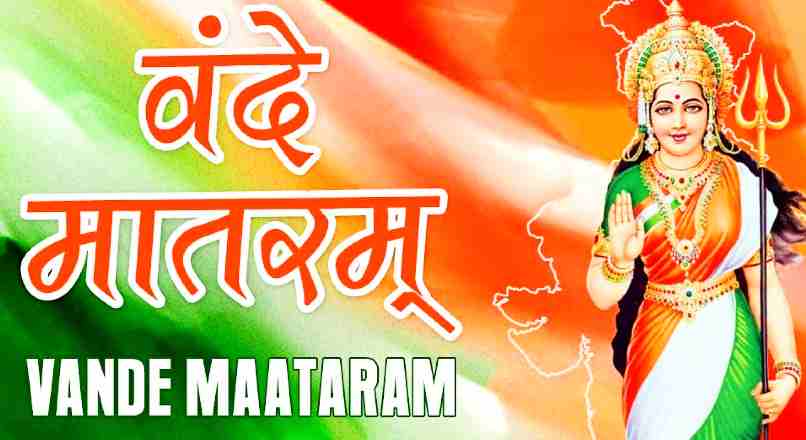Vande Mataram is the national song of India. It was written by Bankim Chandra Chatterjee in a mixture of Bengali & Sanskrit. The first political occasion where it was sung was the 1896 session of the Indian National Congress. In 1950 ( after India’s independence), the song’s first two verses were given the official status of the “national song” of the Republic of India, distinct from the national anthem of India, Jana Gana Mana.
The Vande Mataram song is taken from Bankim Chandra’s patriotic novel “Anandmath.” Initially, it was a Bengali poem with many original Devanagari words (Sanskrit words). Later India‘s Constituent Assembly adopted the first two paragraphs, “Vande Mataram,” as its national song on 24 January 1950.
People and Great writers of India translated Vande Mataram into Hindi, English, Tamil, Telugu, Punjabi, Malayalam, Kannada, and many other languages. The song was sung by the famous singer, the late Lata Mangeshkar. It’s the most plying song on Indian Independence Day.
Vande Mataram Meaning
The term “Vande Mataram” or in Bengali “Bande Mataram” means “I praise thee, Mother(Land) ” or “I adore you, mother/Goddess.” India’s national song Vande Mataram was written by Bankim Chandra Chatterjee. It’s a six-paragraph long song about the devotion of an Indian towards their motherland.
The National Song of India Vande Mataram Lyrics Original in Hindi (Full )
वन्दे मातरम् सुजलां सुफलाम् मलयजशीतलाम् शस्यश्यामलाम् मातरम्। शुभ्रज्योत्स्नापुलकितयामिनीम् फुल्लकुसुमितद्रुमदलशोभिनीम् सुहासिनीं सुमधुर भाषिणीम् सुखदां वरदां मातरम्।। सप्त-कोटि-कण्ठ-कल-कल-निनाद-कराले द्विसप्त-कोटि-भुजैर्धृत-खरकरवाले, अबला केन मा एत बॅले बहुबलधारिणीं नमामि तारिणीं रिपुदलवारिणीं मातरम्।। तुमि विद्या, तुमि धर्म तुमि हृदि, तुमि मर्म त्वम् हि प्राणा: शरीरे बाहुते तुमि मा शक्ति, हृदये तुमि मा भक्ति, तोमारई प्रतिमा गडी मन्दिरे-मन्दिरे।। त्वम् हि दुर्गा दशप्रहरणधारिणी कमला कमलदलविहारिणी वाणी विद्यादायिनी, नमामि त्वाम् नमामि कमलाम् अमलां अतुलाम् सुजलां सुफलाम् मातरम्।। वन्दे मातरम् श्यामलाम् सरलाम् सुस्मिताम् भूषिताम् धरणीं भरणीं मातरम्।।
The National Song of India Vande Mataram Lyrics in English (Full )
Vande Mātaram. Sujalāṃ suphalām Malayajaśītalām Śasyaśyāmalām Mātaram. Śubhra-jyotsnā-pulakita-yāminī Phullakusumita-drumadalaśobhinī, Suhāsinīṃ sumadhurabhāṣinīm Sukhadāṃ Varadāṃ Mātaram. Saptakoṭīkanṭha-kala-kala-ninādakarāle Dbisaptakoṭībhujaidhṛtakharakarabāle, Abalā kena mā eta bale! Bahubaladhārinīṃ Namāmi tarinīṃ Ripudalabārinīṃ Mātaram. Tumi bidyā tumi dharma Tumi hrṛdi tumi marma Tbaṃ hi prānāḥ śarīre. Bāhute tumi mā śakti, Hṛdaye tumi mā bhakti, Tomārai pratimā gaṛi mandire mandire. Tbaṃ hi Durgā daśapraharanadhārinī Kamalā kamala-dalabihārinī Bānī bidyādāyinī Namāmi tbaṃ Namāmi kamalām Amalāṃ atulām, Sujalāṃ suphalām Mātaram Vande Mātaram Śyāmalām saralām Susmitām bhūṣitām Dharanīṃ bharanīṃ Mātaram.
The National Song of India Vande Mataram Lyrics Original in Bengali (Full )
বন্দে মাতরম্ ৷ সুজলাং সুফলাং মলয়জশীতলাম্ শস্যশ্যামলাং মাতরম্ ! শুভ্র-জ্যোত্স্না-পুলকিত-যামিনীম্ ফুল্লকুসুমিত-দ্রুমদলশোভিনীম্, সুহাসিনীং সুমধুরভাষিণীম্ সুখদাং বরদাং মাতরম্ ৷৷ সপ্তকোটীকন্ঠ-কল-কল-নিনাদকরালে, দ্বিসপ্তকোটীভুজৈধৃতখরকরবালে, অবলা কেন মা এত বলে ! বহুবলধারিণীং নমামি তরিণীং রিপুদলবারিণীং মাতরম্ ৷ তুমি বিদ্যা তুমি ধর্ম্ম[a] তুমি হৃদি তুমি মর্ম্ম[b] ত্বং হি প্রাণাঃ শরীরে ৷ বাহুতে তুমি মা শক্তি, হৃদয়ে তুমি মা ভক্তি, তোমারই প্রতিমা গড়ি মন্দিরে মন্দিরে ৷ ত্বং হি দুর্গা দশপ্রহরণধারিণী কমলা কমল-দলবিহারিণী বাণী বিদ্যাদায়িণী নমামি ত্বাং নমামি কমলাম্ অমলাং অতুলাম্, সুজলাং সুফলাং মাতরম্ বন্দে মাতরম্ শ্যামলাং সরলাং সুস্মিতাং ভূষিতাম্ ধরণীং ভরণীম্ মাতরম্ ৷
Vande Mataram Song Translation in English
Translation By Sri Aurobindo Ghosh
Here is the translation in prose of the above two stanzas rendered by Sri Aurobindo Ghosh. This has also been adopted by the Government of India’s national portal. The original Vande Mataram consists of six stanzas and the translation in prose for the complete poem by Shri Aurobindo appeared in Karmayogin, on 20 November 1909.
Mother, I praise thee! Rich with thy hurrying streams, bright with orchard gleams, Cool with thy winds of delight, Dark fields waving Mother of might, Mother free. Glory of moonlight dreams, Over thy branches and lordly streams, Clad in thy blossoming trees, Mother, giver of ease Laughing low and sweet! Mother I kiss thy feet, Speaker sweet and low! Mother, to thee I praise thee. [Verse 1] Who hath said thou art weak in thy lands When the swords flash out in seventy million hands And seventy million voices roar Thy dreadful name from shore to shore? With many strengths who art mighty and stored, To thee I call Mother and Lord! Thou who savest, arise and save! To her I cry who ever her foeman drove Back from plain and Sea And shook herself free. [Verse 2] Thou art wisdom, thou art law, Thou art heart, our soul, our breath Thou art love divine, the awe In our hearts that conquers death. Thine the strength that nerves the arm, Thine the beauty, thine the charm. Every image made divine In our temples is but thine. [Verse 3] Thou art Durga, Lady and Queen, With her hands that strike and her swords of sheen, Thou art Lakshmi lotus-throned, And the Muse a hundred-toned, Pure and perfect without peer, Mother lend thine ear, Rich with thy hurrying streams, Bright with thy orchard gleems, Dark of hue O candid-fair [Verse 4] In thy soul, with bejeweled hair And thy glorious smile divine, Loveliest of all earthly lands, Showering wealth from well-stored hands! Mother, mother mine! Mother sweet, I praise thee, Mother great and free! [Verse 5]
Translation by Keshab Bhattarai
Salutations (to you), oh Mother! (You are blessed with) Richness in water resources, plenty of fruits (and forest resources), flushed with cool air breezing from Malaya mountains; Green with rice plants o ! our motherland Salutations (to you), oh Mother! Where nights are made joyous by sparkling light very beautiful by buds-flowers- and rows of trees Always looking pleasant, sweet speaking giver of happiness and riches o! our motherland! Salutations (to you), oh Mother! Seventy million voices are heard (praising you) in kalakala sound many million hands have taken swords (for your protection) How can I say that you are a helpless woman? I pray (to you), oh savier mother adorned with strength, the destroyer of enemies. Salutations (to you), oh Mother! You are embodiment of wisdom, virtues (religion), love, and the essence (of everything). You are certainly the life force in (our) bodies. Oh Mother, you are strength in (our) arms, Oh Mother, you are devotion in (our) hearts, Your (sacred) image is in every temple Salutations (to you), oh Mother! You are indeed the ten-handed Durga goddess, you are the goddess of wealth, Kamala or Laxmi, residing on the lotus, you are the bestower of (power of) speech and knowledge - Goddess Saraswati, I pray to you. I salute you oh pure unmatched Goddess Kamal. You are blessed with water resources, blessed with plenty of fruits, Salutations (to you), oh Mother! You are peaceful, kind, pleasant, and beautiful. Oh Mother earth, nourisher, salutations. Salutations (to you), oh Mother! Vande Mataram
Vande Mataram – An ode to the motherland
An ode to the Motherland, it was written in Bengali script in the novel Anandmath. The title ‘Vande Mataram’ means “I bow to thee, Mother” or “I bow to thee, Mother”. The “mother goddess” in later verses of the song has been interpreted as the motherland of the people –– Banga Mata (Mother Bengal)and Bharat Mata (Mother India), though the text does not mention this explicitly.
It played a vital role in the Indian independence movement, first sung in a political context by Rabindranath Tagore at the 1896 session of the Indian National Congress. It became a popular marching song for political activism and the Indian freedom movement in 1905. Spiritual Indian nationalist and philosopher Sri Aurobindo referred to it as the “National Anthem of Bengal”. The song and the novel containing it were banned by the British government, but workers and the general public defied the ban, many went to colonial prisons repeatedly for singing it, and the ban was overturned by the Indians after they gained independence from colonial rule.
On 24 January 1950, the Constituent Assembly of India adopted “Vande Mataram” as a national song. On the occasion, the first President of India, Rajendra Prasad stated that the song should be honored equally with the national anthem of India, “Jana Gana Mana”.
About Bankim Chandra Chattopadhyay
Bankim Chandra Chatterjee was born on 27 June 1838 in the 24 Pargana district of West Bengal. He received his primary education in the Midnapur district and later attended Mohsin College of Hooghly.
There he studied for six years, after which he joined the Presidency College in Calcutta in 1856 to get his B.A degree. It was during this time that he started writing. He was also a dedicated government worker for thirty-nine years. He got his job as a deputy collector just out of college.
He worked relentlessly to revive the Bengali intellectual society through his writings. With this view, he started the monthly magazine Bangadarshan in 1872.
Eminent authors of the country greatly appreciate his works, which have been translated into all the chief languages of India. He died on 8 April 1894, but his greatness still reverbs in the hearts of Indians through his writings.

About Anandamath Novel
Around the 1870s, Bankim Chandra Chattopadhyay composed Bande Mataram in Bengali. He proclaimed the motherland India as the mother goddess, and it inspired freedom fighters to fight for the independence of the motherland India. He later included Bande Mataram in his book Anandamath. The book was published in 1882.
Bankim Babu built Ananda Math against the famine and monastic revolt in Bengal. After that, ‘Bande Mataram’ became synonymous with India’s freedom struggle. Bande Mataram was the last word of many freedom fighters across the country before the British carried out the execution.
Vande Mataram National Song Of India – Full Video
Watch on Youtube – https://www.youtube.com/watch?v=epek-fuYxPw
FAQs on India National Song – Vande Maataram
1. What is the difference between the national anthem and the national song?
“Vande Mataram” is the national song of India written by Bankim Chandra Chatterjee, whereas,
“Jana Gana Mana Adhinayaka“ is the National Anthem of India written by Rabindranath Thakur (Tagore).
2. From which novel “Vande Mataram” was taken?
Vande Mataram Song was taken from Bankim Chandra Chatterjee’s famous novel- Anandmath.
3. Anandamath wrote in which year?
Anandamath (The Abbey of Bliss) Bengali novel was published in 1882. Bankim Chandra Chattopadhyay wrote it. Two movies were made based on the “Anandamath novel.” A Bengali movie in 1951 and a Hindi movie in 1952.
4. Who first said Vande Mataram?
Rabindranath Tagore first sang the song in 1896. The song was first publicly performed and acknowledged in the Congress session of 1896 in Calcutta.
5. Why was Vande Mataram written?
It is believed that while working under the government, Bankim Chandra had a profound realization of the hardships of his countrymen under British rule. It inspired him to write the patriotic song ‘Vande Mataram’ as a token of love and devotion toward the motherland.
Also Read:
